

How Teachers Can Use Classroom Video to Improve. As teachers, we aren’t always the best at recalling exactly what happened in our classrooms on a given day or assessing how a lesson is going in real time.
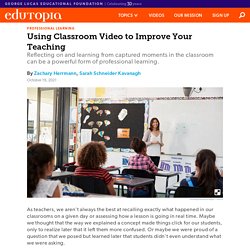
Maybe we thought that the way we explained a concept made things click for our students, only to realize later that it left them more confused. Or maybe we were proud of a question that we posed but learned later that students didn’t even understand what we were asking. For us to grow and develop as professionals, we need to accurately understand the impact of the countless decisions we make every day. This is part of why many teachers find peer and coach observations so helpful. An extra set of eyes in the classroom can help us see, and understand, much more than we could on our own. Unfortunately, synchronous peer observations can be logistically difficult and time intensive. A 5-Step Process 1. 2. 3. 4. 5. Webinar: Creating a Culture of Reflective Practice. Video Self-Reflection: A Close Read Of My Classroom. Enjoy your first three pieces of content for free.
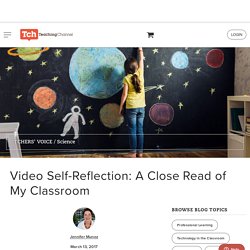
Subscribe for unlimited access. Have questions about subscribing? Video Self-Reflection: What We Don't Know. Enjoy your first three pieces of content for free.
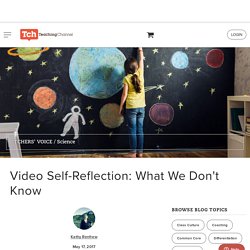
Subscribe for unlimited access. Have questions about subscribing? Click Here to learn more. I felt the blood rushing to my face. The secret to giving great feedback. Video-Stimulated Recall: Aiding Teacher Practice - Educational Leadership. Escape from the Zero-Learning Zone - Educational Leadership. When Coaching Teachers Has Curiosity As Its Primary Goal. Getting Student Feedback: Focus Group. Learn about Teaching Channel Plus for Schools & Districts Sign In or Sign Up.
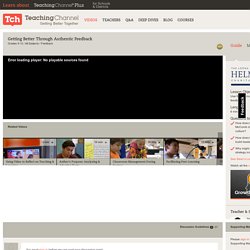
Center for Language Instruction and Coordination at the University of Illinois, Urbana-Champaign. The Best Posts & Articles About Videotaping Teachers In The Classroom. Videotaping teachers in the classroom has been in the news a lot lately, with the Gates Foundation spending millions on doing just that.

I thought a short list of posts and articles that I’ve found informative (or posts that I have written that have helped crystallize my thinking about the topic) might be useful to readers. My posts on the topic include links to extensive newspaper articles on the Gates Foundation project. Here are my choices for The Best Posts & Articles About Videotaping Teachers In The Classroom: Teachers and Nanny Cams: Compliance vs. Trust is a good post from Barnett Berry’s blog. Big Brother vs. Videotaping teachers the right way (not the Gates way) originally appeared in Teacher Magazine, and then was reprinted at The Washington Post yesterday.
Center for Language Instruction and Coordination at the University of Illinois, Urbana-Champaign. Atul Gawande: Want to get great at something? Get a coach. The Best Resources On “Instructional Coaching” Atul Gawande’s feature article The New Yorker this week, Personal Best: Top athletes and singers have coaches.

Should you? , has sure sparked a lot of discussion this week on instructional coaches. I thought I’d bring together a few of what I consider the best resources on the topic. One thing I have found in my research is that it’s pretty scary what’s being done in the name of “instructional coaching” these days. Using video for self reflection. During student teaching, we were taught to reflect upon our day.
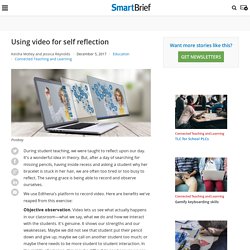
It's a wonderful idea in theory. But, after a day of searching for missing pencils, having inside recess and asking a student why her bracelet is stuck in her hair, we are often too tired or too busy to reflect. The saving grace is being able to record and observe ourselves. Express 12.18 - Go and See: The Key to Improving Teaching and Leading. ASCD Express 12.18 - Go and See: The Key to Improving Teaching and Leading. What I Learned By Recording My Own Teaching. A MiddleWeb Blog New technology is making it easier than ever to create informal classroom recordings of teachers teaching and students learning.
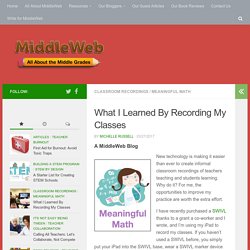
Why do it? For me, the opportunities to improve my practice are worth the extra effort. Making Feedback Meaningful for Teachers - ASCD Empower17. Using video to coach new teachers. Providing all of our teachers, especially those new to the profession, with ongoing and personalized support is a priority of ours at St.
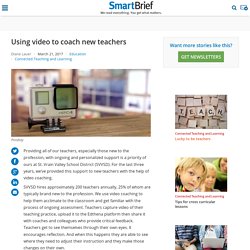
Vrain Valley School District (SVVSD). What Can We Learn from End-of-Course Evaluations? No matter how much we debate the issue, end-of-course evaluations count.
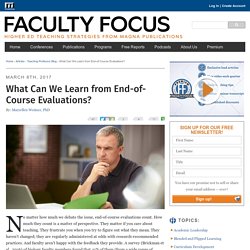
How much they count is a matter of perspective. They matter if you care about teaching. They frustrate you when you try to figure out what they mean. They haven’t changed; they are regularly administered at odds with research-recommended practices. And faculty aren’t happy with the feedback they provide. Videotaping teachers the right way (not the Gates way)
This piece, written by teacher Larry Ferlazzo, provides important context to a project funded by the Bill & Melinda Gates Foundation in which teachers are being videotaped while giving lessons and then evaluated by outsiders. Ferlazzo, who teaches English at Luther Burbank High School in Sacramento, explains why he thinks the Gates project takes the wrong approach and describes a different kind of videotaping exercise at his school that he finds useful. Ferlazzo writes a popular resource-sharing blog, and his third book, “Student Responsibility and Engagement in Your Classroom: A Practical Guide to Classroom Management and Instruction,” will be published this year. He is a member of the Teacher Leaders Network. This piece appeared on the Education Week Teacher website. Coaching Deep Dive. Coaching Deep Dive. Tech Tip: Using video to support teacher training programs.
Each spring semester, the seniors in our student-teacher program complete the edTPA assessment. This performance-based test requires teacher candidates to submit an unedited video recording of them teaching a lesson in the classroom. The recording is part of a portfolio highlighting the individual’s ability to plan, instruct, and assess. Student teachers require frequent and high-quality feedback from faculty in order to develop pedagogically and evolve into reflective educators. This year we used a video-based web platform, ADVANCEfeedback, to provide authentic reflection and discussion to our teacher candidates. The platform supports annotated feedback on classroom videos. Feedback from students was favorable. Teachingchannel. Takeaways From A Video Coaching Experiment. You know the expression “two heads are better than one?”
When it comes to coaching teachers using video, I say that two sets of “eyes” are better than one. Last week, I equipped myself with an iPad and set off to record a lesson in an ELA classroom. I have done a plethora of observations on my own without a camera, and this time I wanted to see if using video for the coaching conversation would make for a more productive coaching experience. And it did. Seeing Is More Than Believing - edu Pulse.
Learn how this leading district uses videos to help improve teachers’ practices. By Diane Lauer Consider these facts: A national survey from Scholastic reveals eight of ten teachers say they need more quality professional development to be successful.TNTP estimates that teachers spend the equivalent of 19 school days per year on training activities.A national report on professional learning found fewer than 50 percent of teachers rated their professional development as useful. By my calculations that’s an astronomical amount of time spent on potentially fruitless activities! Furthermore, it leaves the education system with an urgent problem—districts need to provide effective, collaborative professional development that supports teachers through the implementation stages and addresses the specific obstacles to changing classroom practice (Gulamhussein, 2013).
The benefits of adding video to teacher evaluations. A Harvard researcher shares her national perspective on improving professional development One of the biggest challenges in K-12 education is finding an effective and productive way to evaluate teacher performance. In a world where technology is rapidly reshaping the classroom, it’s natural to look to its potential, especially considering that many schools now have the technology to do classroom observation via video. However, these same schools aren’t yet convinced whether the investment will change status quo evaluations. To find out, in 2012, the Center for Education Policy Research at Harvard, where I work, piloted the Best Foot Forward Project (BFF), a study that grew out of the Measures of Effective Teaching (MET) project.
BFF began with pilot programs in large districts in Georgia and North Carolina as well as Relay Graduate School of Education. We randomly selected half the teachers to be in a treatment group that would take videos of themselves in the classroom. The results. Publications. How peer video coaching is completely changing how our teachers teach. Educational Leadership:Co-Teaching: Making It Work:Saying What You Mean Without Being Mean. Hacking Feedback: Receiving Feedback From Students. This is the final installment of a three-part series by Sean on reforming feedback. Read part two, Hacking Feedback: 3 Strategies + Tools, and part one, Hacking Feedback: The Bookends.
One of my favorite education books is The Courage to Teach. New Harvard Toolkit Supports Using Video to Refine Practice. Swivl. Video In Your Classroom: Tips for Filming and Editing. PD For Teachers - What The Education Experts Know. Teaching Channel Teams was developed based upon research related to the effective use of video and online tools for professional learning. At a recent symposium funded by the National Science Foundation, Teaching Channel brought together leading experts in these fields to discuss this research and the implications it has for 21st century professional learning.
During the symposium, we took the opportunity to interview each of the panelists, asking them to comment on five key themes. Q&A with Pat Wasley: How Video is Redefining Teacher Development. Video is redefining how teacher development happens for many education organizations, creating personalized, professional learning experiences and an evidence base of improving teacher practice. In this Expert Spotlight Q&A, Teaching Channel CEO Pat Wasley explains why the use of video is so powerful, and describes how it is being used effectively. Danielson Group » The Framework.
Loading... 10AdministratiorsWalkThroughofWLClassrooms.pdf. Observation%20Checklist.pdf. Full-class-observation-secondary.pdf. Kansas Coaching Project. The Margins of A Comfort Zone. “Life begins at the end of your comfort zone.” – Neale Donald Walsch When I worked on my master’s thesis over a decade ago, I remember being infatuated with the concept of cognitive dissonance. Observation Challenge: Seeing the Invisible (Part Three of Three) Professional Learning - Reflecting And Improving Student Work (Deeper Learning)
Classroom Observation. Observation Challenge: Seeing the Invisible (Part Three of Three) Observation Challenge: What Do You See (Part Two of Three) Observation Challenge: What Do You Hear (Part One of Three) PD For Teachers - What The Education Experts Know. Video In Your Classroom: Tips for Filming and Editing. A clearer view of the classroom. Raising Academic Achievement. Good Videos On A Growth Mindset, The Importance Of Learning From Mistakes & A Lot More. Takeaways From a Video Coaching Experiment. Tips For Using Video To Improve Teaching. How To Improve Your Teaching With Video. Educational Leadership:Professional Learning: Reimagined:What You Learn When You See Yourself Teach. Coaching Institute aims to help teachers up their game.